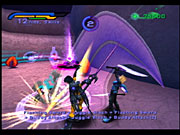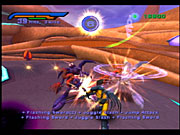Fighting games may have been the first to heavily focus on combining moves together to form an uninterrupted string of actions, but lately, sports and action games have been responsible for some of the most frantic combo-driven gameplay around. Games like Tony Hawk's Pro Skater put a large premium on long, skillful combos, and the action genre has recently seen games like Devil May Cry, which gives players similar rewards for taking out enemies in drawn-out attack sequences. THQ's Alter Echo takes a bit of this combo-driven reward structure and applies it to a sci-fi story that is interesting but is quickly overshadowed by the exciting combat. The resulting game is a lot of fun while it lasts, but is over quickly.

You'll combat Paavo and his echoplast minions with the help of a battle suit made entirely out of echoplast. It seems that the echoplast has become sentient, taking the name Echo in the process, and it wants to help you stop Paavo. Your suit starts out in its default form, which gives you some armor and a sword. But as you go, Echo will build new suit upgrades for you. You can jump between your different forms at will by pressing one of the shoulder buttons. The gun form is a large, slow, armored form that also gives you a large gun so you can fight battles at a distance. The stealth form puts you down on all fours, and it lets you turn invisible, as well as pounce on enemies' backs and swipe at their faces. The stealth form also lets you crawl up walls marked with specific textures. The game runs you through a tutorial at the beginning, showing you what each form can do. After that, however, it annoyingly takes the powers away from you, forcing you back to your sword form until you earn the additional forms over the next couple of levels. Simply starting you out with the default form and sprinkling in the tutorial sequences later on, as you get the new powers, probably would have felt a little better here.
While the game does have its share of simple puzzles, most of Alter Echo's gameplay focuses on combo-based combat. The game has a bit in common with Capcom's Devil May Cry, in that it lets you rack up some pretty insane combos. It keeps track of how many hits and kills you've scored in your current combo, and it's possible to get pretty stylish with your moves. For example, you can use the stealth form's prehensile-tongue attack to pop an enemy up into the air, then switch to gun form and juggle the enemy with your weapon. Longer combos net you more plasm, which is the game's currency. Every few levels, you'll be taken to a room with an upgrade station, where you can spend your points on new attacks or upgrades, like a larger health meter or a more-powerful gun or sword. Since some of the new attacks are great for executing longer, flashier combos, the more items you purchase, the easier the game becomes. Your attacks also become faster as you upgrade your sword, which is great because the gameplay starts out feeling a little sluggish for a game that is so focused on fast combo attacks.
The other portion of Alter Echo's gameplay is, strangely enough, a timing-based puzzle game. This mode pops up for a variety of reasons. The most common instance of the puzzle mode is when you encounter a sync node in the game. When you complete the puzzle at a sync node, Nevin can then reshape that area, usually creating a bridge or opening up a hole in a wall so you can continue ahead. It also pops up when you use your special time dilation attack, which, if you complete the puzzle properly, stops time and shows Nevin executing devastating attacks, usually eliminating most regular foes in one hit.
The level design in Alter Echo is pretty straightforward. While the environments usually have a pretty open-ended look to them, the game is entirely linear in practice. Many of them are also quite short. Though the game does have a lot of areas to it, and enough plot movement to make it feel pretty lengthy, it can actually be finished in around six hours. Most of the plot is decent, though the game also has the annoying trait of putting you up against the same boss more than once, and each time you win, you're given a new set of insignificant-sounding objectives that lessen the impact of the previous encounter.

Graphically, Alter Echo looks good. The environments are large, and the enemies look appropriately menacing. Since the game is all about combo combat, the animation of those combos could obviously make or break the game's overall appearance. Thankfully, the combos look good and animate well. Everything has a slightly glossy look to it, which seems a little strange at first, but since almost everything in the world is made out of echoplast, the look of the game at least makes sense. Alter Echo is appearing on both the Xbox and the PlayStation 2, and, predictably, the Xbox version of the game has a smoother frame rate and a slightly sharper look to its models. The PlayStation 2 version, though it drops a few frames here and there and has a softer look, still looks good.
The audio portion of Alter Echo is also good. The different enemies scream out when attacking, and the sounds of combat are all pretty satisfying. The game makes good use of voice acting throughout the story, and with the exception of Nevin--who weakly wisecracks his way through most of the plot--the speech is well done. The game's music has a futuristic-sounding slant to it, and it fits the action just fine.
All in all, Alter Echo is a solid game. It would have been nice to have seen some more variety in the environments, and the instances of backtracking through areas you've already visited are disappointing. But the game's exciting, free-form combat makes up for those deficiencies. Alter Echo's length makes it a game that you could get away with renting, but its move list means that it'd be worth taking at least a second trip through to try out moves you may have missed the first time around.